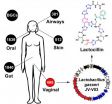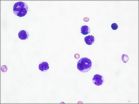(Press-News.org) When people practice simple word classification tasks before nodding off—knowing that a "cat" is an animal or that "flipu" isn't found in the dictionary, for example—their brains will unconsciously continue to make those classifications even in sleep. The findings, reported in the Cell Press journal Current Biology on September 11, show that some parts of the brain behave similarly whether we are asleep or awake and pave the way for further studies on the processing capacity of our sleeping brains, the researchers say.
"We show that the sleeping brain can be far more 'active' in sleep than one would think," says Sid Kouider of Ecole Normale Supérieure in Paris. "Far from falling [into] a limbo when we fall asleep, parts of our brain can routinely process what is going on in our surroundings and apply a relevant scheme of response. This explains some everyday life experiences such as our sensitivity to our name in our sleep, or to the specific sound of our alarm clock, compared to equally loud but less relevant sounds."
The study also extends earlier work on subliminal processing by showing that speech processing and other complex tasks "can be done not only without being aware of what you perceive, but [also] without being aware at all." Kouider suspects that such unconscious processing isn't limited by the complexity of the task, but by whether it can be made automatic or not.
In collaboration with the University of Cambridge, the researchers recorded the EEG of human participants while they were awake and instructed to classify spoken words as either animals or objects by pressing a button, using the right hand for animals and the left hand for objects. The procedure allowed Kouider and his colleagues to compute lateralized response preparations—a neural marker of response selection and preparation—by mapping each word category to a specific plan for movement in the brain. Once that process had become automatic, the researchers placed participants in a darkened room to recline comfortably with eyes closed and continue the word classification task as they drifted off to sleep.
Once the participants were asleep, the testing continued but with an entirely new list of words to ensure that responses would require the extraction of word meaning rather than a simpler pairing between stimulus and response. The researchers' observations of brain activity showed that the participants continued to respond accurately, although more slowly, even as they lay completely motionless and unaware.
Kouider says one could imagine people performing calculations on simple equations while falling asleep and then continuing to identify those calculations as correct or not during a snooze. In Kouider's view, any task that could become automated might be maintained during sleep. On the other hand, he and his colleagues predict that tasks that can't be automated will stop as sleep takes over.
Kouider and his PhD student and co-author Thomas Andrillon are now investigating the consequences of their findings for learning as we slumber. But even if it is possible, it will be worth thinking carefully about why animals, from fruit flies to humans, all show sleep or sleep-like states in the first place.
"Research focusing on how to take advantage of our sleeping time must consider what is the associated cost, if any, and whether it is worth it," Kouider says.
INFORMATION:
Current Biology, Kouider et al.: "Inducing task-relevant responses to speech in the sleeping brain."
You can classify words in your sleep
2014-09-11
ELSE PRESS RELEASES FROM THIS DATE:
Gut microbes determine how well the flu vaccine works
2014-09-11
Annual flu epidemics cause millions of cases of severe illness and up to half a million deaths every year around the world, despite widespread vaccination programs. A study published by Cell Press on September 11th in Immunity reveals that gut microbes play an important role in stimulating protective immune responses to the seasonal flu vaccine in mice, suggesting that differences in the composition of gut microbes in different populations may impact vaccine immunity. The study paves the way for global public health strategies to improve the effectiveness of the flu vaccine. ...
Stem cells help researchers understand how schizophrenic brains function
2014-09-11
Using human induced pluripotent stem cells (hiPSCs), researchers have gained new insight into what may cause schizophrenia by revealing the altered patterns of neuronal signaling associated with this disease. They did so by exposing neurons derived from the hiPSCs of healthy individuals and of patients with schizophrenia to potassium chloride, which triggered these stem cells to release neurotransmitters, such as dopamine, that are crucial for brain function and are linked to various disorders. By discovering a simple method for stimulating hiPSCs to release neurotransmitters, ...
Intestinal bacteria needed for strong flu vaccine responses in mice
2014-09-11
Mice treated with antibiotics to remove most of their intestinal bacteria or raised under sterile conditions have impaired antibody responses to seasonal influenza vaccination, researchers have found.
The findings suggest that antibiotic treatment before or during vaccination may impair responses to certain vaccines in humans. The results may also help to explain why immunity induced by some vaccines varies in different parts of the world.
In a study to be published in Immunity, Bali Pulendran, PhD, and colleagues at Emory University demonstrate a dependency on gut ...
Our microbes are a rich source of drugs, UCSF researchers discover
2014-09-11
Bacteria that normally live in and upon us have genetic blueprints that enable them to make thousands of molecules that act like drugs, and some of these molecules might serve as the basis for new human therapeutics, according to UC San Francisco researchers who report their new discoveries in the September 11, 2014 issue of Cell.
The scientists purified and solved the structure of one of the molecules they identified, an antibiotic they named lactocillin, which is made by a common bacterial species, Lactobacillus gasseri, found in the microbial community within the vagina. ...
Cells put off protein production during times of stress
2014-09-11
DURHAM, N.C. -- Living cells are like miniature factories, responsible for the production of more than 25,000 different proteins with very specific 3-D shapes. And just as an overwhelmed assembly line can begin making mistakes, a stressed cell can end up producing misshapen proteins that are unfolded or misfolded.
Now Duke University researchers in North Carolina and Singapore have shown that the cell recognizes the buildup of these misfolded proteins and responds by reshuffling its workload, much like a stressed out employee might temporarily move papers from an overflowing ...
A non-toxic strategy to treat leukemia
2014-09-11
A study comparing how blood stem cells and leukemia cells consume nutrients found that cancer cells are far less tolerant to shifts in their energy supply than their normal counterparts. The results suggest that there could be ways to target leukemia metabolism so that cancer cells die but other cell types are undisturbed.
Harvard Stem Cell Institute scientists at the Massachusetts General Hospital Center for Regenerative Medicine and the Harvard University Department of Stem Cell and Regenerative Biology led the work, published in the journal Cell, in collaboration with ...
Scientists discover neurochemical imbalance in schizophrenia
2014-09-11
Using human induced pluripotent stem cells (hiPSCs), researchers at Skaggs School of Pharmacy and Pharmaceutical Sciences at University of California, San Diego have discovered that neurons from patients with schizophrenia secrete higher amounts of three neurotransmitters broadly implicated in a range of psychiatric disorders.
The findings, reported online Sept. 11 in Stem Cell Reports, represent an important step toward understanding the chemical basis for schizophrenia, a chronic, severe and disabling brain disorder that affects an estimated one in 100 persons at some ...
Diverse gut bacteria associated with favorable ratio of estrogen metabolites
2014-09-11
Washington, DC—Postmenopausal women with diverse gut bacteria exhibit a more favorable ratio of estrogen metabolites, which is associated with reduced risk for breast cancer, compared to women with less microbial variation, according to a new study published in the Endocrine Society's Journal of Clinical Endocrinology & Metabolism (JCEM).
Since the 1970s, it has been known that in addition to supporting digestion, the intestinal bacteria that make up the gut microbiome influence how women's bodies process estrogen, the primary female sex hormone. The colonies of bacteria ...
Puerto Ricans who inject drugs among Latinos at highest risk of contracting HIV
2014-09-11
Higher HIV risk behaviors and prevalence have been reported among Puerto Rican people who inject drugs (PRPWID) since early in the HIV epidemic. Now that HIV prevention and treatment advances have reduced HIV among PWID in the US, researchers from New York University's Center for Drug Use and HIV Research (CDUHR) examined HIV-related data for PRPWID in Puerto Rico (PR) and Northeastern US (NE) to assess whether disparities among PRPWID continue.
The study, "Addressing the HIV/AIDS epidemic among Puerto Rican people who inject drugs: the Need for a Multi-Region Approach," ...
Chemical signals in the brain help guide risky decisions
2014-09-11
A gambler's decision to stay or fold in a game of cards could be influenced by a chemical in the brain, suggests new research from the University of British Columbia.
The rise and fall of dopamine plays a key role in decisions involving risk and reward, from a baseball player trying to steal a base to an investor buying or selling a stock. Previous studies have shown that dopamine signals increase when risky choices pay off.
"Our brains are constantly updating how we calculate risk and reward based on previous experiences, keeping an internal score of wins and losses," ...



